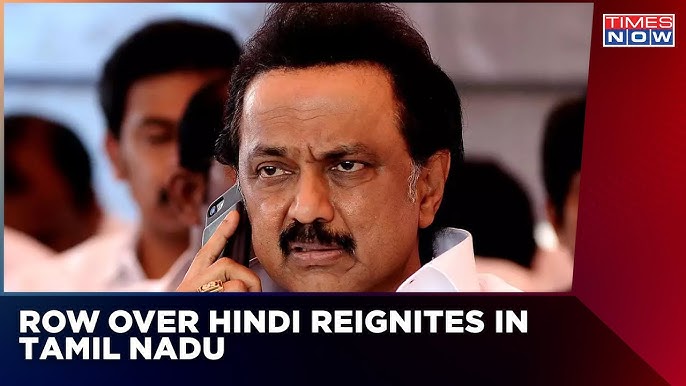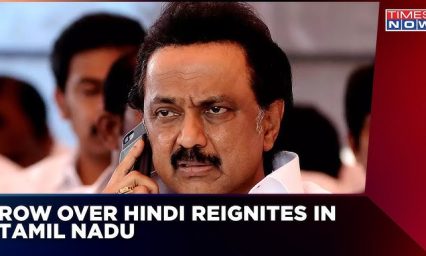The other day, as I was sipping my third cup of filter kaapi at a friend’s home, I was interrupted by a loud and angry television anchor, veins bulging, hair flailing, mouth firing missiles—not about corruption, not inflation—but English!
Apparently, a national leader, perhaps in a moment of cheeky candour or caffeine-fueled courage, asked some Tamil Nadu politicians why they sign their letters in English if they’re so passionate about their own language. I imagine the silence in that room could’ve made even a Tamil movie villain pause mid-thunderclap.
But oh, what a revelation it is!
Suddenly, the battle isn’t about Hindi versus Tamil or North versus South—it’s actually a crusade against English. And not just the Queen’s English, mind you. Even the broken, battered, Hinglish variety isn’t being spared.
The message is simple: “If I can’t speak it, no one should!”
“If I don’t understand English, how dare you!”
It’s the same as breaking everyone’s glasses because you’re short-sighted.
Now, don’t get me wrong. Every language is a beautiful flower in the garden of culture. Tamil is majestic, ancient, and poetic enough to make Shakespeare toss his quill in despair. Hindi has a musical cadence that can make even a traffic cop’s shout sound like a ghazal. Malayalam can twist your tongue and your heart. And yes, even dear Goan Konkani has a lilt that makes fish curry sound romantic.
But when the war on English isn’t about linguistic pride but about linguistic envy, we’ve got a problem. It’s no longer about loving your language—it’s about hating someone else’s success in mastering it. And like most things in life, that never ends well.
Because this war is not just against English—it’s against growing.
But here’s the catch—this isn’t limited to vocabulary and grammar. No sir, this anti-English sentiment has a cousin: the anti-courtesy movement.
“If I don’t know how to say please, why should anyone use it?”
“If I haven’t learnt respect, why should society expect it?”
We’re fast becoming a world where being rude is seen as being real, where arrogance is authenticity, where crassness shows power, and decency dismissed as “fake British manners.”
But civilization wasn’t built on snarls and insults. It was built on dialogue, diplomacy, and yes, a generous dose of “Excuse me” and “May I.”
So, whether it’s language or behaviour, the message must be the same: Elevate, don’t eliminate.
By all means, be proud of your mother tongue. Celebrate it. Promote it. But don’t light a bonfire of English textbooks because your ego’s got third-degree burns.
Because in the end, the true language of a civilized society is not English or Hindi or Tamil—it’s humility, it’s compassion, it’s respect.
And that’s a vocabulary we all need to relearn.
Maybe then, we’ll stop yelling… and start listening..!
————————————————–
Would love to hear from you in the COMMENTS section below…and IF YOU WANT TO RECEIVE BOB’S BANTER EVERYDAY, PLEASE SEND YOUR NAME AND WHATSAPP PHONE NO TO [email protected]
————————————————–
The author conducts many activities connected with writing and speaking, to find out more, Just Click Here










 Robert Clements is a newspaper columnist and writes a daily column, which has graced the pages of over 60 newspapers and magazines, from a daily column in the Khaleej Times, Dubai, the Morning Star, London, and in nearly every state in India, from The Statesman in Kolkata, to the Kashmir Times in Kashmir to the Trinity Mirror in Chennai.
Robert Clements is a newspaper columnist and writes a daily column, which has graced the pages of over 60 newspapers and magazines, from a daily column in the Khaleej Times, Dubai, the Morning Star, London, and in nearly every state in India, from The Statesman in Kolkata, to the Kashmir Times in Kashmir to the Trinity Mirror in Chennai.
Amazing write-up… very very true Bob.
Thank you Bruce
Awesome dissection of our preconceived silly notions about English and any language that is spoken all over the country.
Language is a medium of communication, not a barrier!
Thank you Shylaja
It’s a reality that in India even our illiterate grandparents are using English language in ordinary conversation. Example like (Network)
Truly , it’s humility, it’s compassion, it’s respect…..and that’s a vocabulary we all need to relearn . So well said .
Thanks Bob for your wonderful column. English was/is considered to be a civilized, educated person’s language. What you said is correct: “If I can’t speak it, no one should” The illiterate used this argument and turned the English speaking people who are literate into the illiterate group. The purpose of language is to communicate in a polite manner and not a weapon to humiliate and hurt someone who speak a different language.
Incidentally, a week ago one of the officers of SBI branch in Bengaluru had the extreme audacity of saying “I will never speak in Kannada” to a Kannada political activist group. In this case I fully agree that being a North Indian she may not know Kannada but had she been humble in her known dialect, the activists would have forgiven her but look at the level at which this issue is escalated. Where is the language of love, humility and meekness when I don’t know another language. Sad!
True. Humility can build bridges not walls.